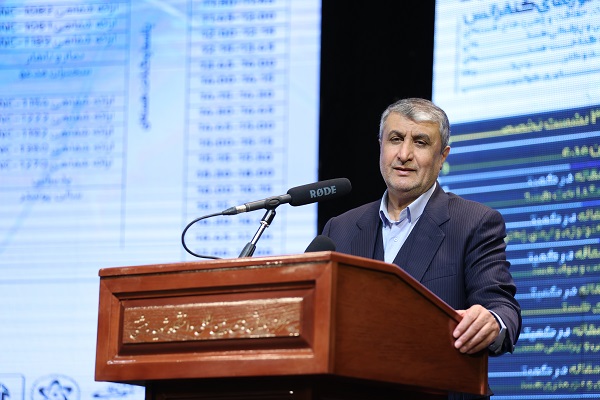Mohammad Eslami, who heads Iran’s Atomic Energy Organization (AEOI), announced that Iran intends to export its nuclear technological products.
“For the first time this year, we have participated in three international exhibitions in the field of nuclear technology, and will make all our efforts to export technological products in the nuclear field to other countries in addition to meeting domestic needs,” Eslami said on the sidelines of the 28th Iranian Nuclear Conference on February 27.
“Today more than one million people use Iranian radiopharmaceuticals, and if we didn't have this opportunity and such a capacity, Iranians wouldn't have been able to benefit from this advantage,” he added.
According to Eslami, Iran has made significant advancements in terms of wealth and research opportunities in the nuclear field, which has led to the country exporting nuclear equipment and radiopharmaceuticals.
Previously, Iran’s Foreign Minister Hossein Amir-Abdollahian proposed the implementation of a “Plan B” in case attempts to revive the 2015 nuclear agreement, known as the Joint Comprehensive Plan of Action (JCPOA), do not succeed.
“Tehran welcomes diplomacy but is “ready to implement ‘Plan B’ if the US opts to take a different path,” Amir-Abdollahian said at a joint press conference with his Iraqi counterpart Fuad Hussein in Baghdad on February 22.
Amir-Abdollahian stated that a team from the International Atomic Energy Agency (IAEA) would be visiting Iran “in the coming days” to address the safeguards issues between Tehran and the UN nuclear watchdog. It remains uncertain whether the delegation will be led by the Director General of the IAEA, Rafael Grossi.
Iranian Foreign Ministry Spokesman Nasser Kanani said last August that Iran had a “Plan B,” which is “the continuation of foreign policy with more vigor and seriousness.”
Bloomberg reported on February 19 that IAEA inspectors had found uranium enriched to a purity of 84 percent — just below the 90 percent required for a bomb — and are trying to determine if it was produced intentionally.
Behrouz Kamalvandi, who serves as the Spokesperson for the AEOI, refuted any claims of Iran engaging in activities that deviate from established protocols. He stated that Iran has not attempted to enrich uranium beyond the 60 percent threshold. On February 27, Kamalvandi announced that Rafael Grossi, the Head of the UN nuclear watchdog, is expected to visit Iran soon after being formally invited by the country following “constructive and promising” discussions between the delegations of Iran and the UN nuclear agency.
Meanwhile, on February 22, the Iranian nuclear chief Mohammad Eslami, said that “the JCPOA talks were conducted to build trust between the P5+1 and the Islamic Republic. The main parties to the deal, however, and especially America, did not cooperate and did not permit others to cooperate with Iran.” Eslami further said “a certain political current that only wants to exert pressure” was expecting Tehran to unilaterally fulfill its obligations without benefiting from the fruits of the JCPOA, adding: “We will not tolerate these acts of creating contention.”
Efforts to revive the JCPOA have been at a standstill for several months due to what US and European officials have referred to as Iran’s “excessive demands.” After the US withdrew from the nuclear deal in May 2018, Iran began gradually increasing its uranium enrichment, and has since announced that it has enriched uranium up to a purity level of 60 percent.
At a meeting held during the Munich Security Conference on February 18, the top diplomats of the USA, France, Germany, and the UK expressed their concerns about several issues related to Iran. They expressed concern over “Iran’s nuclear escalation and lack of cooperation” with the IAEA, as well as the growing military cooperation between Iran and Russia, Iran’s “egregious human rights abuses” against its citizens, and Tehran’s “destabilizing activities.”







 Russian Foreign Minister Sergei Lavrov has reasserted that Moscow has no intentions to stop the fighting in Ukraine, even if peace talks commence.
Russian Foreign Minister Sergei Lavrov has reasserted that Moscow has no intentions to stop the fighting in Ukraine, even if peace talks commence.
 Iran has refuted reports of alleged damage to Shimon Peres Negev Nuclear Research Centre located southeast of Dimona, Israel, during the recent air...
Iran has refuted reports of alleged damage to Shimon Peres Negev Nuclear Research Centre located southeast of Dimona, Israel, during the recent air...
 Iran’s Foreign Minister, Hossein Amir-Abdollahian, has labeled a foiled Israeli drone attack in certain parts of the country as a "failure" for Isr...
Iran’s Foreign Minister, Hossein Amir-Abdollahian, has labeled a foiled Israeli drone attack in certain parts of the country as a "failure" for Isr...



